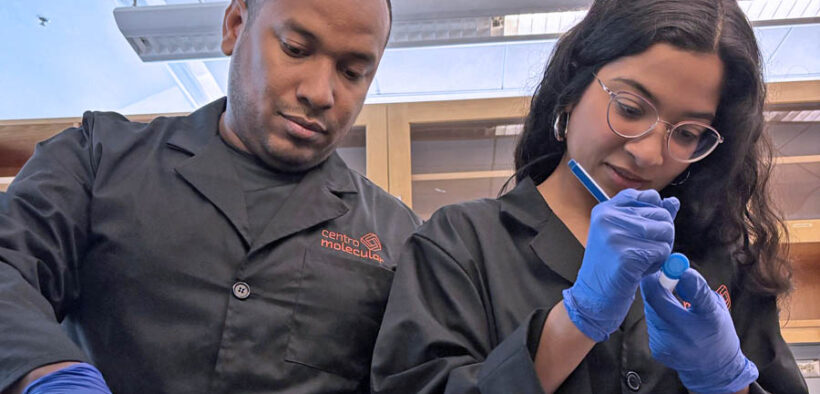UPR researchers develop device for bipolar disorder monitoring

The wearable sensor will provide real-time lithium monitoring through sweat analysis.
A team of researchers from the University of Puerto Rico (UPR) is developing LilaTToo, a first-of-its-kind wearable medical device designed to monitor lithium levels in patients with bipolar disorder. The project is based at Bench 2-22 in the Molecular Center-University of Puerto Rico, a scientific entrepreneurship incubator.
Described as a “removable sticker or tattoo,” LilaTToo detects lithium levels through sweat analysis, using photonic crystals that change color in real time. This noninvasive technology aims to provide immediate and accurate monitoring, eliminating the need for frequent blood tests.
Bipolar disorder is a chronic condition characterized by extreme mood swings and requires consistent lithium monitoring to ensure proper dosage and avoid side effects. LilaTToo’s scientific director, Liz N. Santiago-Martoral, highlighted its potential to improve patient care.
“This project has the potential to transform patient care by providing a tool that not only improves the accuracy of monitoring biomedical parameters but also empowers patients and caregivers to make more informed decisions,” said Santiago, a graduate of UPR-Río Piedras’ Department of Chemistry doctoral program, specializing in analytical chemistry.
She noted that while lithium monitoring is the starting point, the goal is to expand the technology to track other drugs and biomarkers.
“Once we perfect this technology, we plan to expand its capabilities to include other relevant drugs and biomarkers,” she added.
How LilaTToo works
LilaTToo’s wireless and non-invasive sensor detects lithium levels in sweat and transmits data to a mobile application. The project’s executive director, Adrialis Figueroa-Sánchez, explained its potential impact on patient monitoring.
“The health professional can use the results to adjust lithium dosage, while caregivers can monitor real-time data and identify potential health risks before they become critical,” said Figueroa, a graduate student in health management at UPR’s Medical Sciences Campus.
Currently, no at-home lithium test kits exist in Puerto Rico or the U.S., requiring patients to rely on blood tests, which can be inconvenient.
“Our device offers continuous monitoring, allowing lithium patients and their caregivers to track lithium concentration easily,” said Luis Bermúdez-Morales, the project’s director of operations. “This technique simplifies the process and increases accessibility for both patients and caregivers.”
A year away from a prototype
The team is now working on the sensor’s color-changing matrix, a critical component indicating lithium levels. The first prototype is expected within a year.
“We’re working to ensure that the color change of our photonic crystals accurately reflects lithium concentrations. Once we achieve this, we will have completed one of our most important milestones,” said Figueroa.
The project is supported by UPR-Río Piedras’ Center for Support to Innovation and Commercialization (I+C) and the Molecular Center, which have provided laboratory space and assistance in prototype development.
According to Puerto Rico’s Department of Health, in 2018, 3,107 people were diagnosed with bipolar disorder, representing 2.7% of mental health patients on the island. The World Health Organization reported that in 2019, about 40 million people worldwide suffered from bipolar disorder.
Given the lack of noninvasive lithium monitoring tools, LilaTToo has the potential to improve treatment accessibility for bipolar patients globally.
“The impact that LilaTToo can have on the quality of life of people with chronic medical conditions or mental disorders motivates us to continue with this development,” Santiago said.





Estoy sumamente orgullosa y emocionada por ese logro en la ciencia. Eh vivido toda la vida con una persona bipolar y es bien lamentable que por falta de un buen diagnóstico sigan medicando cada tres meses a un paciente sin saber el nivel adecuado hasta llevarlo a una sala de intensivo por intoxicación del medicamento. Así que estoy súper emocionada y contenta de que le hayan prestado la importancia a esta condición para que tanto el paciente como el cuidador puedan tener calidad de vida y no ser juzgado ni marginados por quizás comportamiento indeseados cuando no están en control así que de todo corazón GRACIAS y esperemos en Dios que culmine la investigación y lo puedan recetar lo antes posible